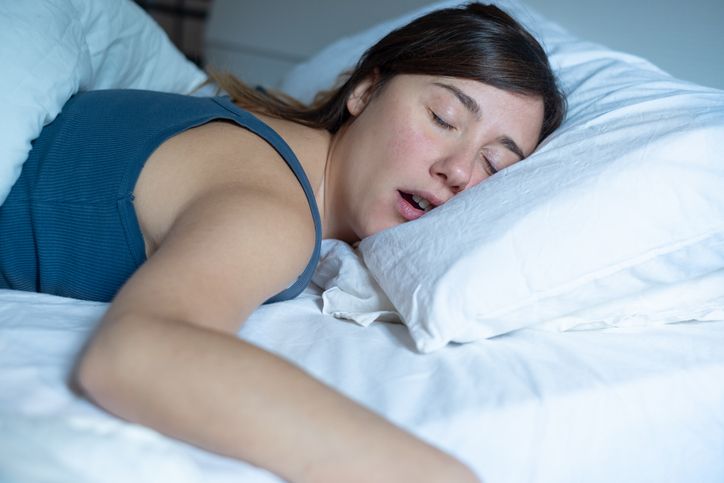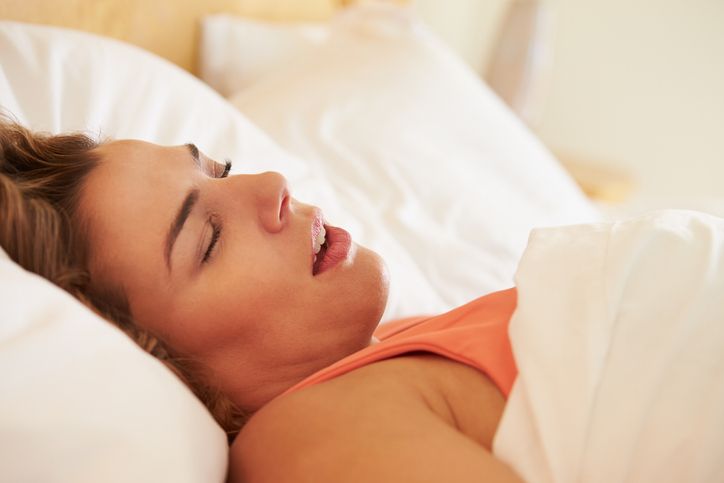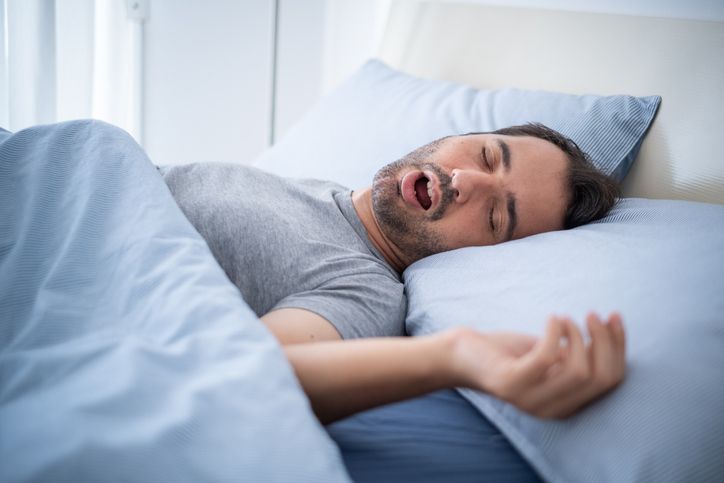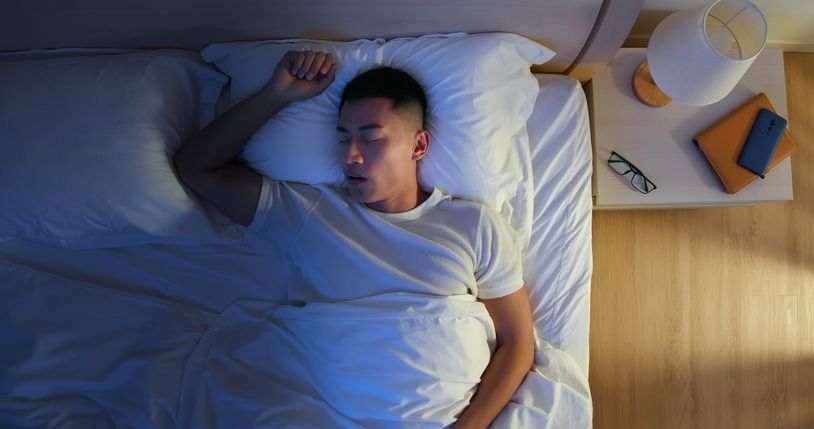- Home
- Trend
- Weight Loss Strategies
- Acne Tips
- Hair Health Information
- Blemish Removal Tips
- Acne Scar Removal Tips
- Muscle Building Techniques
- Intimate Care Tips
- Postpartum Intimate Care
- Eye Bags Wiki
- Tips for Face Slimming
- Secret of Permanent Hair Removal
- Breast Enlargement Tips
- Cure to Snoring
- Marionette Lines
- Skin-Tightening Secrets

免費體驗
Fotona 4D NightLase Snoring Treatment
1 Minute Self-Registration
Date should not be before minimal date
Waking up feeling breathless can be a distressing experience. Shortness of breath at night, also known as nocturnal dyspnea, can have various underlying causes, ranging from mild to severe. Identifying the root cause and seeking appropriate treatment is essential to ensure restful sleep and overall well-being. In this comprehensive guide, we will delve into the common causes of shortness of breath at night, potential treatments, and when it's crucial to seek medical attention.
1
Common Causes of Shortness of Breath at Night

Asthma
Asthma is a long-term lung disease that causes the airways to become swollen and narrow. Asthma symptoms can get worse at night because of things like lying down, being exposed to allergens like dust mites in beds, or changes in temperature and humidity. This narrowing of the lungs can cause wheezing, coughing, and shortness of breath, which makes it hard for people with asthma to sleep well.
Heath failure or heart condition
Some heart problems, like congestive heart failure, can cause blood to build up in the lungs. This is called pulmonary edema, and it can make it hard to breathe, especially when lying down. When the body is flat while sleeping, fluid can build up in the lungs. This makes it hard for the lungs to expand, which makes it hard to breathe.
Gastroesophageal Reflux Disease (GERD)
GERD is a disease in which stomach acid flows back into the oesophagus, irritating it. When a person is lying down, it is easier for the acid to move up the stomach and reach the throat or even the airways. This soreness can make it hard to breathe, which can be especially noticeable at night when people are lying down.
Anxiety and panic attacks
Feelings of emotional distress, anxiety, or panic attacks can cause physical signs, such as shortness of breath. At night, when the mind is less busy, people may be more aware of their anxiety or fear, which can make it hard to breathe and feel like they are suffocating.
Respiratory infections
Infections of the lungs and airways, like pneumonia or bronchitis, can cause swelling and congestion. Changes in posture and greater inflammation during sleep can make these conditions worse at night, making it hard to breathe and uncomfortable.
Sleep apnea
This is one of the most common and most experienced issues that most people have nowadays. Obstructive sleep apnea is a sleep disease in which you stop breathing repeatedly while you sleep because your upper airway is blocked. These breaks in breathing can wake you up many times during the night, making it hard to get back to sleep and leaving you short of breath when you wake up. Sleep apnea can make it hard to get a good night's sleep and make you tired during the day.
It's important to remember that having trouble breathing at night can be a major problem that may need medical help. If you realise you have trouble breathing during sleep and other symptoms that last for a long time or get worse, it's time to get treated.
2
Experience difficulty breathing? Treatments for Shortness of Breath at Night

1. Asthma management
Healthcare professionals typically prescribe two types of medications for asthma, which is:
- Inhalers (Bronchodilators): These medications relax and widen the airways, making it easier to breathe. Short-acting bronchodilators provide quick relief during acute symptoms, while long-acting bronchodilators help control asthma over a more extended period.
- Anti-inflammatory Medications: These drugs reduce airway inflammation and prevent asthma symptoms from occurring. They include inhaled corticosteroids, leukotriene modifiers, and long-acting beta-agonists (LABAs).
2. Heart condition treatment
For heart-related causes of breathing difficulties, treatment options focus on managing heart function and reducing fluid retention. Depending on the specific heart condition, healthcare professionals may prescribe medications such as:
- Diuretics: These drugs help the body get rid of excess fluid, reducing fluid buildup in the lungs and other tissues.
- ACE Inhibitors or ARBs: These medications help relax blood vessels and improve heart function.
- Beta-Blockers: These drugs can be used to manage certain heart conditions and help reduce the heart's workload.
In severe cases, surgical interventions or other medical procedures may be necessary to address underlying heart issues.
3. GERD management
To manage GERD and its impact on breathing, a combination of lifestyle changes, diet modifications, and medications is typically recommended:
- Lifestyle Changes: Elevating the head of the bed during sleep, avoiding large meals close to bedtime, quitting smoking, and maintaining a healthy weight can help reduce GERD symptoms.
- Diet Modifications: Avoiding trigger foods and beverages that can worsen acid reflux, such as spicy and acidic foods, caffeine, and alcohol, can be beneficial.
- Medications: Healthcare professionals may prescribe antacids, H2 blockers, or proton pump inhibitors (PPIs) to reduce stomach acid production and alleviate GERD symptoms.
4. Sleep apnea solutions
The primary treatment for obstructive sleep apnea is Continuous Positive Airway Pressure (CPAP) therapy. This involves wearing a CPAP mask during sleep, which delivers a continuous stream of air pressure to keep the airway open and prevent pauses in breathing.
CPAP therapy helps to improve oxygen levels, reduce snoring, and alleviate nighttime breathlessness associated with sleep apnea. In some cases, dental devices or surgery may be considered as alternative treatments for sleep apnea.
3
When to Seek Medical Attention?

While occasional mild shortness of breath may not be unusual and could be related to temporary factors such as physical exertion or anxiety, certain symptoms warrant immediate medical attention. If you experience any of the following signs along with shortness of breath, it is essential to seek prompt medical evaluation:
Alert 1: Severe and sudden shortness of breath at night
Experiencing a sudden onset of severe shortness of breath during the night can be a sign of a serious medical condition that requires urgent evaluation. It could be related to acute exacerbations of respiratory conditions like asthma or chronic obstructive pulmonary disease (COPD), heart-related issues, or even pulmonary embolism (a blood clot in the lung). Seeking medical attention promptly is crucial to identify the underlying cause and initiate appropriate treatment.
Alert 2: Chest tightness, pain or pressure
The combination of shortness of breath with chest pain or pressure can be indicative of a potentially life-threatening condition, such as a heart attack or other cardiac issues. These symptoms should never be ignored, and emergency medical care should be sought immediately.
Alert 3: Blue-tinged lips or skin
Blue-tinged lips, fingertips, or skin (cyanosis) suggest a lack of adequate oxygen in the blood. This can be a sign of a severe respiratory or circulatory problem and requires urgent medical assessment to address the underlying cause and improve oxygenation.
Alert 4: Wheezing or audible breathing sounds
Persistent wheezing or unusual breathing sounds during episodes of shortness of breath may indicate narrowing of the airways or obstruction in the respiratory system. These symptoms may be associated with conditions like asthma, bronchitis, or even anaphylaxis (severe allergic reaction).
Any sudden, severe, or persistent shortness of breath accompanied by alarming symptoms like chest pain, cyanosis, wheezing, or concerning respiratory secretions requires immediate medical attention. These symptoms may indicate serious medical conditions that need to be promptly assessed and treated by qualified healthcare professionals to ensure the best possible outcomes. If you or someone you know experiences such symptoms, do not delay seeking emergency medical care.
4
How Fotona 4D Nightlase Snoring Treatment Get You A Good Night Sleep

Even if you happen to fall under the category with breathing problems and sleep apnea is the cause, you should get it treated as soon as possible even if it doesn’t sound as serious as other shortness of breath symptoms. Snoring needs to be fixed for more than just the pleasure of the person who snores. It has a big effect on the health and quality of sleep of the sleeping partner. Even if you are living alone, this can make you more irritable, less productive, and less able to think clearly, and lead to mental health deterioration eventually.
To help you breathe comfortably at night, the Fotona 4D NightLase Snoring Treatment offers a highly effective and non-invasive solution for snoring. This treatment utilizes a painless and non-surgical approach that targets the collagen-fibrous networks of the mouth tissues. By stimulating collagen production and tightening the tissues, the treatment reduces the size of the tonsils, uvula, and jaw opening. This effectively opens up the airway, allowing for smoother airflow during sleep and significantly reducing or eliminating snoring.
One of the notable benefits of curing sleep apnea with Fotona 4D NightLase is the potential improvement in sleep quality and overall health. Snoring and sleep apnea can lead to disrupted sleep patterns, daytime fatigue, and reduced cognitive function. By addressing the underlying cause of snoring and sleep apnea, individuals can experience more restful and uninterrupted sleep, leading to increased energy levels, enhanced concentration, and improved mood during the day.
Moreover, the treatment's non-invasive nature means there is no need for surgery or incisions, minimising the risks associated with traditional surgical interventions. Patients can typically complete the Fotona 4D NightLase Snoring Treatment in as little as 15 minutes, and there is no downtime required afterward. This means individuals can resume their regular activities, including dieting habits, immediately after the treatment without any significant disruptions to their daily routine.
Overall, Fotona 4D NightLase Snoring Treatment offers a safe, efficient, and patient-friendly solution for snoring and sleep apnea. By reducing or eliminating issues like difficulty breathing and snoring, the treatment can contribute to better sleep quality, improved daytime functioning, and enhanced overall well-being for both the individual and their sleep partner. However, if you are having really bad sleep disorders symptoms, or having worsening or prolonged shortness after trying multiple methods, it is essential for you to undergo a comprehensive evaluation by a healthcare professional to determine your medical condition. Achieve restful nights and breathe easier with the help of Perfect Medical.

免費體驗
Fotona 4D NightLase Snoring Treatment
1 Minute Self-Registration
Date should not be before minimal date
5
Fix Your Sleeping Environment: Home Remedies That Could Help to Relieve Symptoms

While awaiting the effect of other treatments and medical evaluation, or just as complementary measures, these home remedies may provide some relief from shortness of breath at night.
Your sleeping position matters
Elevating the upper body with extra pillows can be helpful for individuals experiencing shortness of breath due to conditions like GERD or heart-related symptoms. By sleeping with the upper body slightly elevated, gravity can help prevent stomach acid from flowing back into the oesophagus, reducing GERD-related irritation. Additionally, this sleeping position may alleviate fluid buildup in the lungs for individuals with heart conditions, making it easier to breathe during the night.
Air purifiers
Using air purifiers in the bedroom can be beneficial, especially for people with asthma or allergies. Air purifiers help remove airborne particles like dust, pollen, pet dander, and mold spores, which can trigger respiratory symptoms and worsen breathing difficulties. Improved indoor air quality can reduce the risk of asthma exacerbations and improve overall respiratory health, leading to better sleep and reduced nighttime breathlessness.
Steam inhalation
Steam inhalation is a simple and effective method to ease respiratory congestion and facilitate easier breathing. The warm, moist air can help soothe irritated airways and loosen mucus, making it easier to expel. Individuals with respiratory infections, colds, or allergies may find relief by inhaling steam from a bowl of hot water, a steam inhaler, or by taking a hot shower before bedtime.
Relaxation techniques
Practising relaxation techniques can be particularly helpful for individuals who experience shortness of breath at night due to anxiety or stress. Techniques such as deep breathing exercises, meditation, progressive muscle relaxation, and mindfulness can help calm the mind and body. By reducing stress and anxiety levels, these practices can alleviate anxiety-related breathing difficulties and promote better sleep quality.
Hydration
Staying hydrated is essential for overall health and can be beneficial for individuals experiencing breathing difficulties during respiratory infections. Drinking plenty of fluids, particularly water, can help thin mucus secretions, making it easier to clear the airways and breathe more comfortably. Proper hydration also supports the body's immune system, which is crucial for fighting off infections and aiding in the recovery process.
6
Conclusion

By getting the right care and using home remedies, you can take an active part in managing their health, which can lead to better results and a better quality of life. Hold the power to deal with health problems in your own hands, so you can get it resolved ahead of time, and work toward overall wellness.

免費體驗
Fotona 4D NightLase Snoring Treatment
1 Minute Self-Registration
Date should not be before minimal date
FAQ

1. Does bad air quality in the room make people snore?
Yes, poor air quality in a room can potentially lead to snoring. Snoring is often caused by the obstruction or narrowing of the airway during sleep, which can result from various factors. Poor air quality can contribute to snoring in the following ways: If the air in the room contains allergens such as dust mites, pet dander, pollen, or mould spores, it can trigger nasal congestion and inflammation. This can lead to a blocked or stuffy nose, making it difficult for air to pass through the nasal passages, and increase the likelihood of snoring. Low humidity levels in the room can dry out the nasal passages and throat, causing irritation and congestion. Dry air can also lead to increased production of mucus, which may further contribute to snoring by obstructing the airway.
2. What is PND?
The medical term for PND is called paroxysmal nocturnal dyspnea. It is marked by rapid, severe shortness of breath that usually happens during sleep and wakes the person up quickly. These episodes can be scary and upsetting because they make you feel like you can't breathe and are suffocating.
3. Is sleep apnea considered a medical emergency, and when should I seek immediate medical attention?
Yes, sleep apnea can be a medical emergency, especially if there are signs of severe obstructive events during sleep, choking or gasping for air, or if the person is observed to stop breathing altogether. If you suspect sleep apnea and experience any of these symptoms, seek urgent medical attention.
4. How can I distinguish between a common cold and a severe upper respiratory infection that requires medical attention?
While both conditions can present with similar symptoms like cough, congestion, and sore throat, a severe upper respiratory infection may also include high fever, difficulty breathing, chest pain, or the production of yellow or green mucus. If you experience any of these severe symptoms, consult a healthcare professional promptly.
5. My partner's snoring is causing tension in our relationship. What can we do to improve the situation?
Addressing snoring together is essential for maintaining a healthy relationship. Encourage your partner to seek medical evaluation for potential underlying sleep apnea or other snoring causes. Consider using white noise machines, earplugs, or separate sleeping arrangements temporarily until a solution is found. Open communication and empathy are crucial in navigating this issue together.








